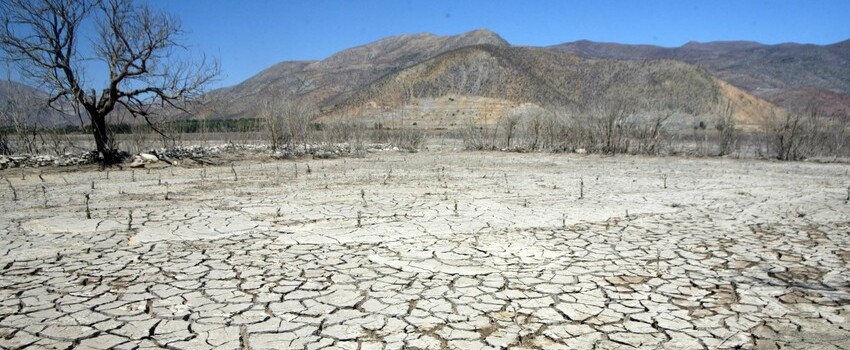
An expert in the area and creator of multiple studies, he spoke at the University of La Serena before a large number of social leaders about this real option for areas affected by the lack of water resources.
Nanofiltration is emerging as a viable option to alleviate and confront the drought that affects different areas of the Coquimbo Region. This was announced by Dr. Engineer, from the University of Concepción, Rodrigo Bórquez, who spoke to more than 300 people who attended the Seminar “Water and Development: a challenge for local actors”, organized by the University of La Serena and the Association of Rural Municipalities of Norte Chico.
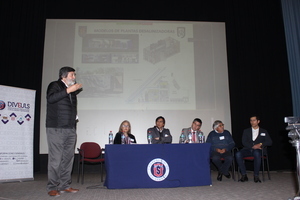 According to what was stated by the expert, this technique that is used in the purification of water, not just drinking water, seeks the elimination of organic substances, which promotes the reuse of the resource and provides solutions to those who use water in different productive activities. , so thinking about this intervention in times of drought would be the solution for thousands of people who today, in the Coquimbo Region, describe the situation as catastrophic and a critical tragedy.
According to what was stated by the expert, this technique that is used in the purification of water, not just drinking water, seeks the elimination of organic substances, which promotes the reuse of the resource and provides solutions to those who use water in different productive activities. , so thinking about this intervention in times of drought would be the solution for thousands of people who today, in the Coquimbo Region, describe the situation as catastrophic and a critical tragedy.
The academic, who has studied the recovery of components, desalination of seawater and brackish water, provided details of the semipermeable membrane technology, as well as the options that small ranchers and farmers have, to associate and be able to carry out the installation of pumps that generate this type of solution, which would give hope to those who today wait for help from the State, through the different organizations that deal with what has been classified as the worst drought in Chile in many years. .
The academic pointed out that the first unit that was built to desalinate water was built in 2012 and was used in Llico, and then they moved to Lake Vichuquén, to put the osmosis technique into practice. Then it was the turn of the commune of Arauco and thus sectors have joined, which shows that it is possible to face an adverse situation with respect to water and with the support of the State.
How to access these pumps? According to the expert, the best way is to apply for a project directly to SUBDERE, supported by the municipality to which the affected sector belongs, applying through the neighborhood improvement area.
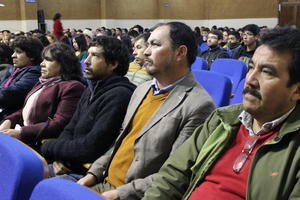 “The best thing they could do is for the municipalities where the affected communities are to present it as a viable project through the SECPLAC and rely on the studies we have carried out. We are willing to help in this matter and we have the experience, from the academy we have carried out applied research and it has given results,” said Dr. Bórquez, who opened himself to the full possibility of being able to help with the technology that he himself adapted to the use of water and its reuse.
“The best thing they could do is for the municipalities where the affected communities are to present it as a viable project through the SECPLAC and rely on the studies we have carried out. We are willing to help in this matter and we have the experience, from the academy we have carried out applied research and it has given results,” said Dr. Bórquez, who opened himself to the full possibility of being able to help with the technology that he himself adapted to the use of water and its reuse.
The desalination of brackish water - not just sea water - is an option to supply sectors with water for irrigation; On a large scale it is a process of high monetary costs, however, the option that Dr. Bórquez provides is a solution that could supply an entire group of families, for undoubtedly lower figures, without reaching the need to transport animals to saving them from starvation, as is being done in the region, where the San Juan mountain range, Argentina, has been the momentary solution.
Today the community is seriously concerned and the Government has established extremely urgent measures to alleviate the situation. According to figures provided by INDAP, the mass of livestock losses exceeds 50%, therefore, using technologies to benefit those directly affected is hope for those who see how the internal variability of the climate and the impact human impact on climate change has wreaked havoc on what was once a fertile valley.
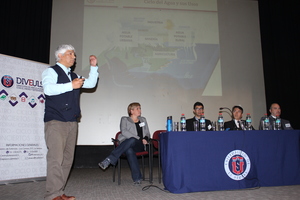 The presentation of the researcher and chemical engineer took place in the context of discussion of different panels where social leaders, experts from PROMMRA ULS, CEAZA and CAZALAC, Senator Adriana Muñoz, the Seremi of Mining, Roberto Vega, and the mayor of Combarbalá participated. Pedro Castillo, among other guests who participated in the Seminar, held at the University of La Serena.
The presentation of the researcher and chemical engineer took place in the context of discussion of different panels where social leaders, experts from PROMMRA ULS, CEAZA and CAZALAC, Senator Adriana Muñoz, the Seremi of Mining, Roberto Vega, and the mayor of Combarbalá participated. Pedro Castillo, among other guests who participated in the Seminar, held at the University of La Serena.
A space for reflection on water scarcity
Regarding the development of this Seminar, the Vice-Rector for Research and Postgraduate Studies of the ULS, Dr. Eduardo Notte, highlighted: “for us it is practically a civic and social duty to hold these types of conversations in our university due to the role we play in academia and research. It is fundamental for the contribution and development of public policies based on scientific studies, in the generation and delivery of knowledge as an educational partner, and in this case as a partner in technical and scientific diagnosis.”
For his part, from the co-organization of the Association of Rural Municipalities of Norte Chico, the mayor of Combarbalá, Pedro Castillo, emphasized that “the objective of this seminar was to propose a reflection, as the vice-rector said, regarding the progress that "The studies and academia have generated regarding water in the Coquimbo Region, we speak with a vision of the future regarding drinking water, water in multiple scenarios and in situations of conflict, such as the discussion of profound changes to the water code." .
See the presentations of the first block:
See the presentations of the second block:
Written by Patricia Castro (DirCom) and Jenifer Araya (DIVEULS)
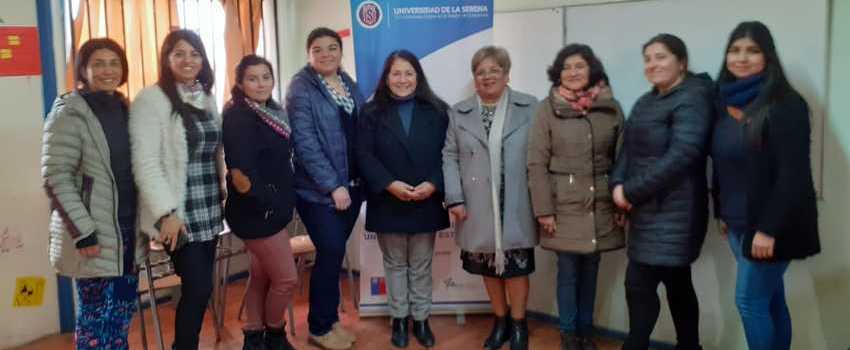 The activity was carried out by the ULS Inclusion and Disability project team at the Huachalalume Intercultural School.
The activity was carried out by the ULS Inclusion and Disability project team at the Huachalalume Intercultural School.
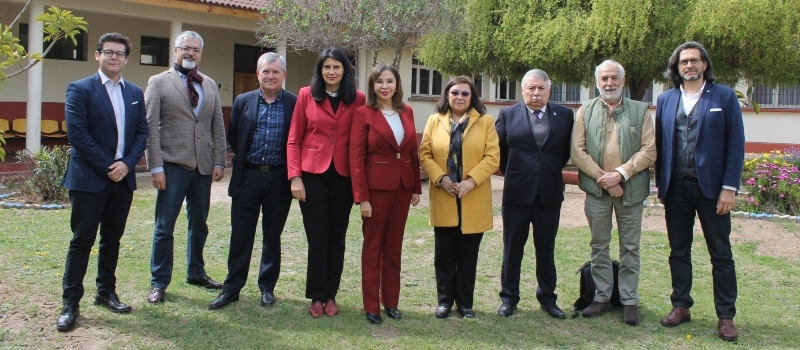
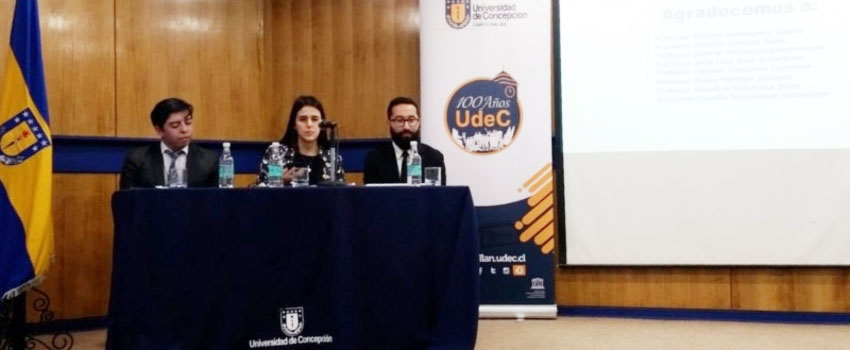
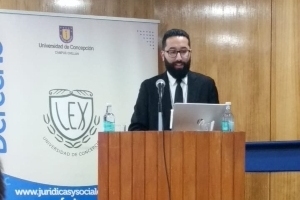
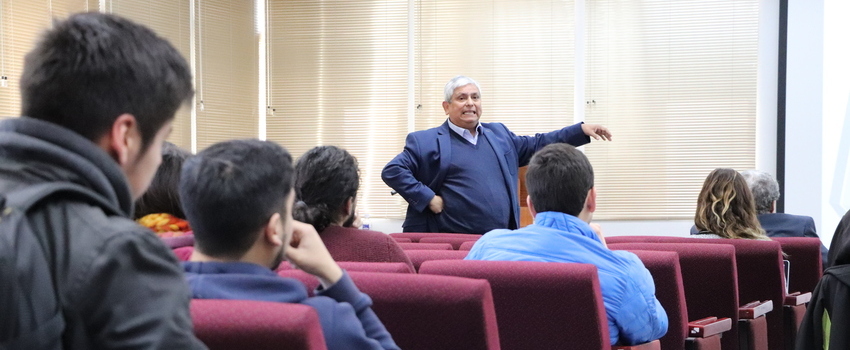
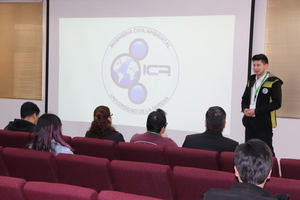

 According to what was stated by the expert, this technique that is used in the purification of water, not just drinking water, seeks the elimination of organic substances, which promotes the reuse of the resource and provides solutions to those who use water in different productive activities. , so thinking about this intervention in times of drought would be the solution for thousands of people who today, in the Coquimbo Region, describe the situation as catastrophic and a critical tragedy.
According to what was stated by the expert, this technique that is used in the purification of water, not just drinking water, seeks the elimination of organic substances, which promotes the reuse of the resource and provides solutions to those who use water in different productive activities. , so thinking about this intervention in times of drought would be the solution for thousands of people who today, in the Coquimbo Region, describe the situation as catastrophic and a critical tragedy. “The best thing they could do is for the municipalities where the affected communities are to present it as a viable project through the SECPLAC and rely on the studies we have carried out. We are willing to help in this matter and we have the experience, from the academy we have carried out applied research and it has given results,” said Dr. Bórquez, who opened himself to the full possibility of being able to help with the technology that he himself adapted to the use of water and its reuse.
“The best thing they could do is for the municipalities where the affected communities are to present it as a viable project through the SECPLAC and rely on the studies we have carried out. We are willing to help in this matter and we have the experience, from the academy we have carried out applied research and it has given results,” said Dr. Bórquez, who opened himself to the full possibility of being able to help with the technology that he himself adapted to the use of water and its reuse. The presentation of the researcher and chemical engineer took place in the context of discussion of different panels where social leaders, experts from PROMMRA ULS, CEAZA and CAZALAC, Senator Adriana Muñoz, the Seremi of Mining, Roberto Vega, and the mayor of Combarbalá participated. Pedro Castillo, among other guests who participated in the Seminar, held at the University of La Serena.
The presentation of the researcher and chemical engineer took place in the context of discussion of different panels where social leaders, experts from PROMMRA ULS, CEAZA and CAZALAC, Senator Adriana Muñoz, the Seremi of Mining, Roberto Vega, and the mayor of Combarbalá participated. Pedro Castillo, among other guests who participated in the Seminar, held at the University of La Serena.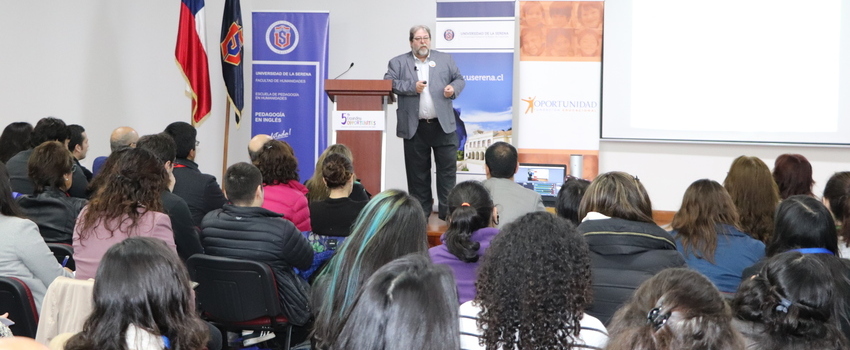
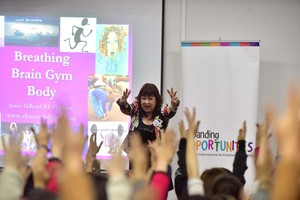 The activity included presentations by Susan Hillyard, founder and director of the SHELTA English academy, and Gabriel Díaz, director of the Ludus Center for innovation and pedagogical experimentation at the Catholic University of Uruguay, who addressed new forms and the importance of teaching English to students from an early age.
The activity included presentations by Susan Hillyard, founder and director of the SHELTA English academy, and Gabriel Díaz, director of the Ludus Center for innovation and pedagogical experimentation at the Catholic University of Uruguay, who addressed new forms and the importance of teaching English to students from an early age.